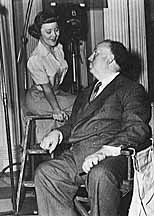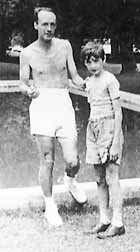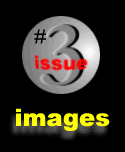|
While there were vast differences between the lives of Hitchcock and
Nabokov, there were also some profound similarities that I feel
shed some light on their careers and work. To begin with, Hitchcock and Nabokov came from substantially different
backgrounds. Hitchcock's father was a London wholesale grocer and
young Alfred grew up in a stable but distinctly middle class home.
Nabokov's father was an intellectual, a member of Russia's ruling class
and part of the provisional government first established after the
revolution. Vladimir Nabokov grew up in a privileged environment that
stressed academics (a colleague of Nabokov's father wrote of the baby
Vladimir: "I had the impression that this would be an extremely abnormal
upbringing in fatally over-abundant circumstances")5 and Nabokov was
a life long academic and teacher, in addition to being a writer.
Hitchcock, by the mid-1950's was a world wide celebrity and a member of
the Hollywood film community, living in an environment far removed from
Nabokov's academia. But both men appear to have been kindred spirits in
their youth; Hitchcock in particular was shy and bookworm-ish and read
extensively. Even as adults, despite their outward differences, they
lived remarkably similar lifestyles.
Both men were born in the same year, 1899, began their 'artistic lives'
at the same time (the mid 1920's) and died within three years of each
other. Both men had long marriages and depended on their wives for both
professional, as well as personal, support. Both had but one child,
Nabokov a son and Hitchcock a daughter, and the children of each was
involved in their father's work (Dimitri Nabokov translated some of his
father's novels and Pat Hitchcock acted in three of her father's
films).

Alfred Hitchcock with his daughter. |

Vladimir Nabokov with his son.
|
In addition to these similarities, Hitchcock and Nabokov both
emigrated to the United States within about a year of each other, where
each accomplished his most popular and celebrated works. Both men can
be considered to have two careers, the first in their original homelands
(Hitchcock's British films and Nabokov's writings in Russian while
living abroad in Europe) and the second in the United States
(Hitchcock's Hollywood films made beginning with Rebecca in 1940 and
Nabokov's writings in English, beginning with The Real Life of Sebastian
Knight published also in 1940).
Most importantly for our purposes, Hitchcock and Nabokov were both
certainly influenced by many of the same artistic sources: 19th century
writers such as Poe and Stevenson, whom they read while growing up. In
addition, they nearly collaborated at one point; according to Donald
Spoto, Hitchcock asked Nabokov to work on the screenplay to the film
that was eventually made as Frenzy (1972).6 Nabokov had to decline
due to his own work schedule, but one can only imagine what kind of a
film these two men would have made together. No wonder, then, that
Nabokov, having recalled seeing The Trouble with Harry (1955), said of
Hitchcock "his humor noir is akin to my humor noir, if that's what it
should be called."
page 1 of 4

|


